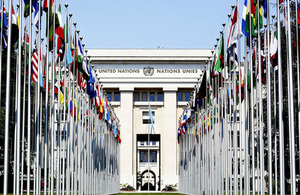MHRA and the Bill & Melinda Gates Foundation to look at the safer, effective use of medicines during pregnancy
In advance of World Patient Safety Day (17 September), MHRA specialists, as part of a broader programme of work, have begun developing ground-breaking research to support the safer use of medicine during pregnancy.
A $360,000 grant over two years from the Bill & Melinda Gates Foundation (approximately £292,000), will support the MHRA’s research, to help predict the need for adjusting a medicine’s dose during different trimesters of pregnancy. This will ensure effective use, which is vitally important for the health of mother and baby.
Worldwide, data in this area remain limited, and new insights could potentially impact the health of pregnant women around the world. This would also give obstetricians further clarity on the optimal dose of a medicine, when treating pregnant patients, for whom use of a medicine is necessary.
When pregnant or breastfeeding, it is generally recommended to avoid the use of medicines, although more than half of all pregnant women consume at least one medicinal product during their pregnancy.
Medicine use can be essential to safeguard the health of mother and baby. This includes treating existing conditions such as diabetes, epilepsy or cardiovascular conditions. However, for many medicines, unless indicated for use during pregnancy, the best regimen and dosage levels during different stages of pregnancy are largely unknown.
It is also difficult to predict whether doses of medicines, which are effective during early pregnancy, will produce their desired effect at a later stage. In this research, MHRA specialists will use prediction models to develop recommended medicine dosages for pregnant women in the UK. This includes evaluating existing models— known as physiologically based pharmacokinetic (PBPK) models and simulations to develop a full picture for all stages of pregnancy.
The Agency will also provide training for healthcare professionals on how to use the models, and there will be a dedicated web portal.
The portal will host MHRA research on the effects of physiological changes which occur during pregnancy, and their impact on medicine exposure. The results of model predictions will also be available on the portal, allowing the opportunity for different research groups to upload and share their modelling, turbo-charging developments in this area.
Dr June Raine, Director of Vigilance and Risk Management of Medicines, MHRA said:
“Patient safety is our highest priority and we are determined to support innovation in this important area, which helps improve the quality of health for pregnant women in the UK and internationally.
“This work provides a valuable launch pad for new developments into, and improved understanding of how pregnancy affects medicine levels. That’s why we are encouraging healthcare professionals, research groups and those looking to supply medicines during pregnancy, to make full use of the prediction models, data and resources we will provide.”
Trevor Mundel, President of Global Health, Bill & Melinda Gates Foundation said:
“We’re excited to play a part in the work that MHRA is doing around maternal health. We hope the innovative use of computer-aided modelling will help make medicine use safer and more effective for pregnant women around the world. We are dedicated to improving the quality of people’s lives and look forward to the outcome of new developments in this area.”
Notes to Editors
- PBPK modelling is a technique for predicting the absorption, distribution, metabolism and excretion (ADME) of synthetic or natural chemical substances in humans and other animal species.
- PBPK modelling is undertaken using a software used in computer-aided modelling, which the MHRA research will involve.
- As pregnancy advances, there are considerable physiological changes in the woman over the three trimesters, leading to clinically important changes in absorption, distribution, metabolism and elimination of medicines.
- Nausea and vomiting and alterations in gastric pH and GIT motility during pregnancy may alter medicine absorption; increased cardiac output and intestinal blood flow may increase absorption.
- It is essential for clinicians to be aware of the pregnancy-related changes in PK and/or PD and to critically examine the potential clinical implications of these changes for a pregnant patient and the dosage of a medicine she may need.
- The [Medicines and Healthcare products Regulatory Agency](https://www.gov.uk/government/organisations/medicines-and-healthcare-products-regulatory-agency is responsible for regulating all medicines and medical devices in the UK by ensuring they work and are acceptably safe. All our work is underpinned by robust and fact-based judgements to ensure that the benefits justify any risks.
- The MHRA also includes the National Institute for Biological Standards and Control (NIBSC) and the Clinical Practice Research Datalink (CPRD). MHRA is an executive agency of the Department of Health and Social Care.
